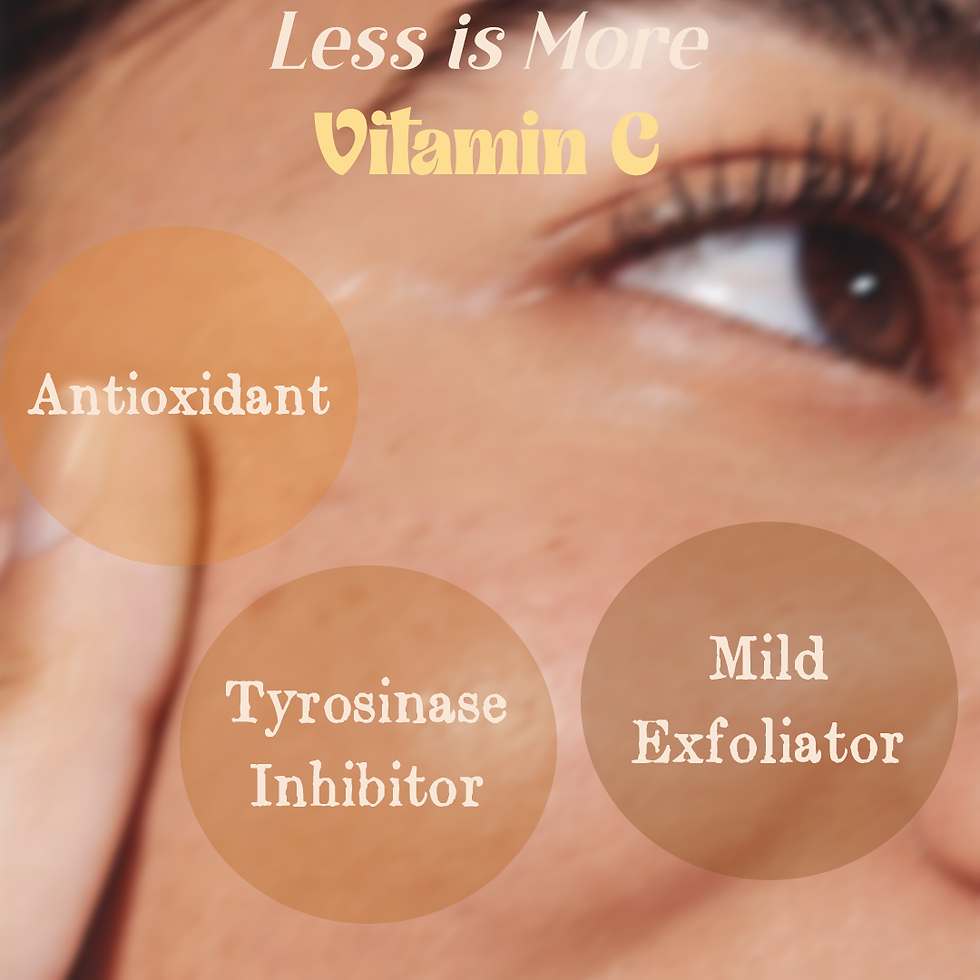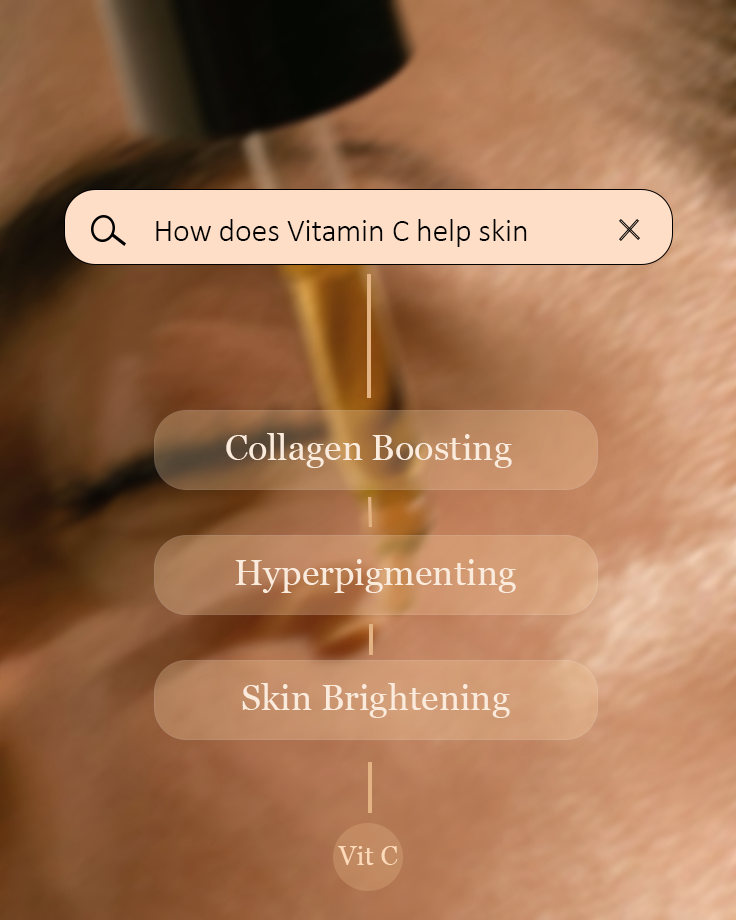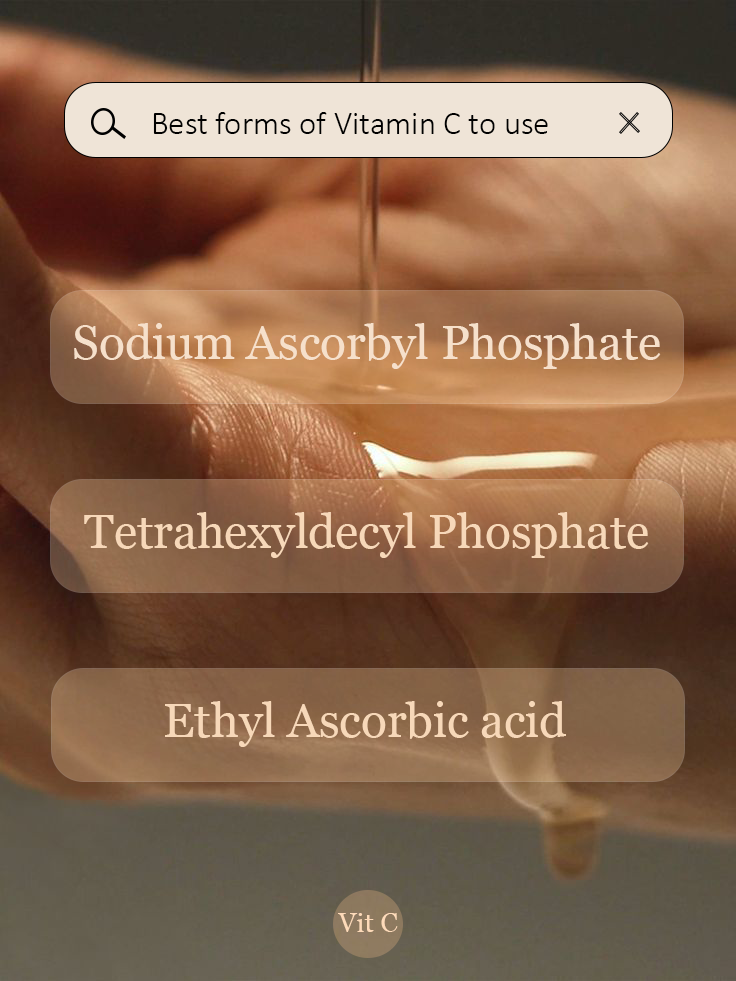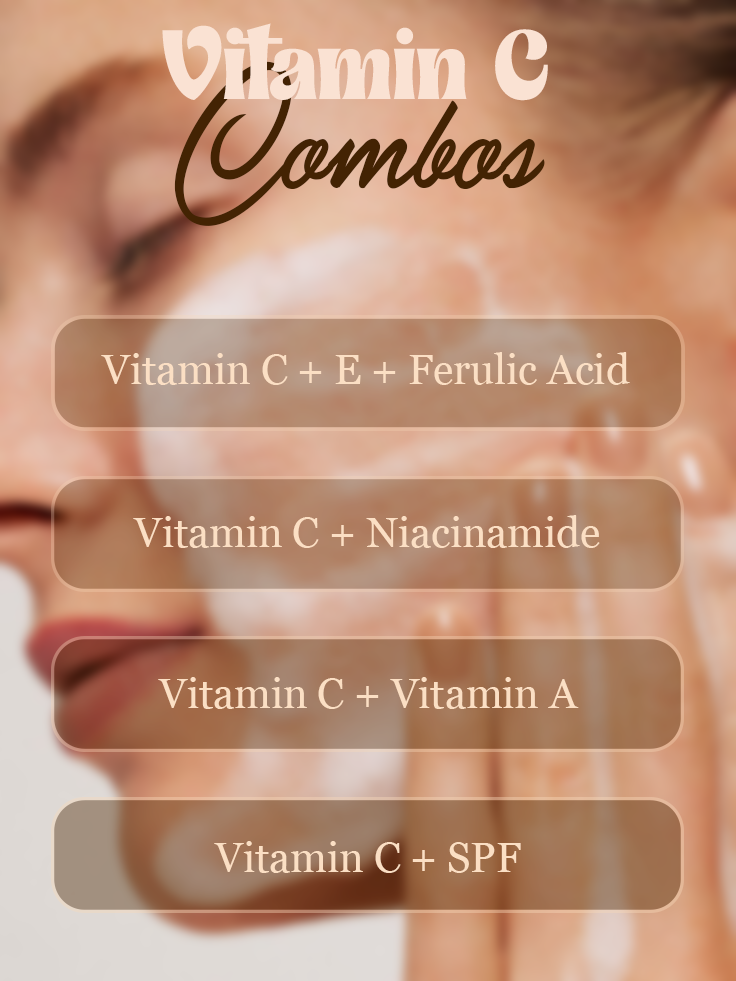Vitamin C Skincare Products in India and Best Skincare Routine
- Kavya Goswami
- Jun 9
- 10 min read
Updated: Sep 7
When we think about skincare, a few top ingredients pop up in our heads when we think about achieving spotless, glowing skin. Vitamin C is one of the most prominently talked about and recommended products on the internet, which most companies introduce, and major celebrities and influencers tell you about.
When we talk about Vitamin C the one word that comes to our mind is instant "brightening effect" because that's what most people tell you and that's how most brands represent Vitamin C. Do you think brightening is the only merit of using Vitamin C? If not, then what are the other benefits of Vitamin C? What exactly is Vitamin C and can you incorporate it in your daily skincare routine?
It's time to answer all your queries, get real about Vitamin C, and learn how it can help revive your skin's health and give you supple, soft, smooth skin.

Let's get real: Vitamin C Skincare Benefits
What is Vitamin C?
Vitamin C, commonly known as L-ascorbic Acid, is the water-soluble, active form of Vitamin C. It is an incredible antioxidant that can work wonders for your skin. Vitamin C is a very unstable compound, as it is an antioxidant, which means it easily oxidizes in the presence of oxygen.
Antioxidants protect skin from Free Radical damage which can occur due to pollution, sunlight, smoke, stress and dirt. Vitamin C with the help of its antioxidizing properties stabilizes and protects your skin.

What are the benefits of Vitamin C in skincare routine?
Vitamin C is concentrated in the epidermis of the skin and acts as a co-factor for the production of Proline, Hydroxylase and Lysine, key amino acids for the production of collagen, stabilizes the Collagen molecule and provides your skin anti-ageing benefits. Vitamin C increases the production of both collagen and elastin, which help keep the skin plump and firm.
Vitamin C also acts as a Tyrosinase Inhibitor, which means it inhibits the production of tyrosinase, a key enzyme needed within the Melanocytes to produce Melanin. It prevents hyperpigmentation evens out the skin cells and soothes our skin by reducing the production of melanin compounds in our skin, thus reducing dark spots.
Vitamin C is the most potent antioxidant in the skin as it helps in reducing oxidative stress caused by excess free radicals which can break up your skin cells and cause premature ageing i.e. Photoaging, which is triggered due to sun rays leading to redness, uneven skin texture and wrinkles.
Vitamin C has good anti-inflammatory properties i.e. it helps to reduce redness in skin by mending damaged capillaries and giving a smoother appearance.
Hydration is the key to keeping your skin youthful and healthy, vitamin C plays a key role in the epidermis layer of skin and helps to prevent water loss by keeping it smooth and hydrated by protecting it from becoming too dry or oily.
Vitamin C has another magical benefit of regeneration of cells which takes place due to its ability to produce collagen and anti-inflammatory properties.
Vitamin C has mild exfoliating properties, that's how it helps to clean the top layer of skin and provides clean glowing skin. Its exfoliation property is the main reason for the instant brightening effect.
Vitamin C skincare products are used in the form of Serums, Moisturizers, cleansers and as a boosting ingredient in sunscreens.
Know Your Vitamin C
Vitamin C is an antioxidant and there are various derivatives i.e. active and inactive forms of Vitamin C which are categorized based on differences in oxidizing nature and their pH value. Not all derivatives of Vitamin C work in the same way for your skin some of them can be sensitizing for your skin and can cause skin irritation. Not to trigger excessive redness or inflammation we need to learn about the best derivatives of Vitamin C, how it works and what is the most common form of Vitamin C.
L-ascorbic Acid, the most common and active form of Vitamin C is formulated under a very low pH of 2.6 – 3.4. Due to its low pH and high oxidizing properties, it can be too irritating for the skin and when formulated in your skincare products with poor packaging it can easily oxidize and lose its effect with time.
If a product is formed with the active form of Vitamin C, i.e. L-ascorbic acid then it is crucial to check that the derivative used for products is formulated in good packaging and has an ideal portion for your skin type. Most skin types can use L-ascorbic acid at 10-15% but it can be too irritating for your skin. Usually, L-ascorbic acid is not considered ideal for skin of colour as it can be irritating to your skin and can trigger hyperpigmentation.
Derivatives of Vitamin C
Sodium Ascorbyl Phosphate – It is a good stable, water-soluble form of Vitamin C as it is formulated at pH 7, hence, it’s not irritating for skin and works well for oily, acne-prone skin, and it also works on dark spots. But it has very slow absorption power.
Magnesium Ascorbyl Phosphate – It can be considered a fine form of Vitamin C, but it’s poorly absorbed in our skin and does not show any visible benefits to your skin. It works best to provide hydration and it does not have any other benefits to the skin.
Tetrahexyldecyl Phosphate – It is the best form of Vitamin C as it is lipid-soluble, also known as fat-soluble. It is stable at pH 5, has great absorption power, provides collagen benefits and is ideal for all skin types, especially sensitive skin.
Ascorbyl Glucoside – This is a water-soluble form of Vitamin C, that brightens the skin and leads to firmer skin. Once it gets into the skin an enzyme, called Alpha-glucosidase breaks it down into Ascorbic acid and gently repairs your skin.
Ethyl Ascorbic acid – It is a water-soluble derivative of Vitamin C. This type of Vitamin C works great to give you the collagen-boosting effect.
Ascorbyl palmitate – It has good absorption power, but doesn’t do much for your skin as it does not have any visible anti-ageing or anti-inflammatory effects on the skin.
Aminopropyl Ascorbyl phosphate (AAP) – It is a new form of Vitamin C which came across from Korean brands and there is not enough data available to know how well it works for your skin.
Do you know?
Vitamin C when oxidises, it converts into a substance called Erythrulose, which is a tanning agent. Hence, it needs to be formulated at a pH of 3.5 or below, so, that it can get absorbed in your skin.
5 Things to Look for in Your Vitamin C Skincare Products
Form of Vitamin C used
Vitamin C percentage
Packaging
pH of the formulation
Additional ingredients in the formula

Is knowing your skin type crucial while using Vitamin C?
Yes, it is crucial to know your skin and skin type before start using Vitamin C. If you are someone with sensitive skin, then you need to make sure you are using Vitamin C products with a lower percentage, that is less than 10% because anything higher can be too irritating for your skin and can damage the skin barrier.
If you have oily, acne-prone skin, using a higher percentage of Vitamin C can be hazardous to use in your skincare routine as it can lead to breakouts and hyperpigmentation. So, it is required to start at a low percentage, such as 2%. You can increase the amount eventually if your skin feels relaxed and adapts to it.
If you are someone with a normal skin type or think your skin is ready to take a high percentage of Vitamin C, only then go to a higher percentage, like 15-20%, otherwise, stick to the lower percentage.
Similarly, works for Dry skin types, first know your skin and then move ahead to the higher percentage.
In skincare, one thing to remember is, that MORE is not MORE. Always use products in moderation and don’t overuse them. If a product has a higher percentage of an ingredient that doesn’t mean it is a good product.
What are the most common derivatives of Vitamin C in skincare products?
The most common derivative of Vitamin C that is typically used in skincare products like serums, cleansers, moisturizers and sunscreens. As Vitamin C is an exfoliator, most commonly it is available in the form of serums, and most of the serums contain the active form of Vitamin C, i.e. L-ascorbic Acid which is not good for your skin as it oxidizes very easily. L-ascorbic acid, if formulated at a higher percentage can be degrading for your skin and can damage the skin barrier.
Another most prevalent form of Vitamin C is the inactive form of Ethyl Ascorbic Acid which is the water-soluble form of vitamin C and slowly converts into ascorbic acid when used.
What to Consider When Buying a Vitamin C Skincare Products?
When purchasing a Vitamin C product, it's essential to pay attention to its packaging. Since Vitamin C is an antioxidant and a highly unstable ingredient, it should be protected from air and sunlight. Ideally, look for products that are in opaque, airless packaging. Unfortunately, many products are packaged in pipettes or droppers, which is not the best option.
The next thing to remember is what form of Vitamin C is being used in the product and at what percentage.
Always know your skin type before using a product and never overuse it. MORE is not MORE.
Check for products which are fragrance free and do not contain any denatured alcohol as it can lead to contact dermatitis.
What’s the best time to use Vitamin C in Your Skincare Routine?
It is ideal to use Vitamin C in both day and nighttime skincare routine. You can always use Vitamin C in morning skincare routine along with your sunscreen to elevate its effect and get full-proof protection from the sun.
Always remember: Vitamin C + Vitamin A combo is only for people who can tolerate it or use it in a gap of 10-15 minutes in your night skincare routine.

How to Incorporate Vitamin C in Skincare Routine?
AM Routine:
Cleanser: Start with a gentle cleanser to remove any impurities from your skin.
Toner (optional): If you use a toner, apply it after cleansing. It can help balance your skin’s pH.
Vitamin C Serum: After your skin is clean and dry, apply a vitamin C serum. This is when your skin will benefit most from the brightening and antioxidant properties of the vitamin C.
Moisturizer: Follow with a lightweight moisturizer to hydrate and lock in the benefits of the serum.
Sunscreen: Sunscreen is crucial in the AM, especially with vitamin C. It helps protect your skin from UV damage, which can undo the brightening effects of the serum. Apply a broad-spectrum SPF 50 or higher as the last step.
You can avoid using moisturizer if you have oily, acne-prone skin and can apply sunscreen directly after serum.
PM Routine:
Cleanser: Start by cleansing to remove makeup, dirt, and sunscreen from the day.
Toner (optional): Apply a toner if part of your routine.
Vitamin C Serum: You can continue using your vitamin C serum in the PM if you like, though some people prefer to use it only in the AM for the added sun protection benefits.
Moisturizer: Hydrate your skin with a richer moisturizer at night to nourish and lock in moisture as you sleep.
Best Vitamin C Skincare Products to Buy in India
Check out all the best skincare with Vitamin C you should be using for your skin:

10% Vitamin C Face Serum For Glowing Skin by Minimalist is an ideal serum as it is suitable for all skin types and will work well for your skin if you are a novice to the skincare game. This serum is enriched with 3-O-Ethyl Ascorbic Acid, an inactive, water-soluble form of Vitamin C and has good absorbing power. This form of Vitamin C does not oxidize too easily and is suitable for your skin. This serum has good exfoliation properties as it contains Gluconolactone and Lactic Acid, which are AHAs, i.e. our surface exfoliators. It’s also suitable for acne-prone skin as it contains Centella Asiatica Leaf Water as a solvent that helps to treat redness and flaky skin.
10% Vitamin C Face Serum by The Derma Co. is another good choice if you are starting to incorporate Vitamin C in your skincare routine, as it does not have a very high percentage of Vitamin C, which can irritate certain skin types. It contains a good derivative of Vitamin C, i.e. 3-O-Ethyl Ascorbic Acid, along with another antioxidant, Ferulic Acid, which helps to stabilize Vitamin C and works great for your skin. It also contains another master ingredient, which has great cell-communicating properties, Niacinamide (Vitamin B3), which helps to tighten skin pores and soothes skin.
Booster Serum 10% Vitamins C + E + F by Simple is a serum to consider in your skincare routine as it contains an excellent form of vitamin C, Sodium Ascorbyl Phosphate. This form of vitamin C has good absorption power and helps to deliver all significant benefits of vitamin C, i.e. boosts collagen, reduces hyperpigmentation and brightens your skin. It contains other antioxidants like Vitamin E, aka Tocopheryl Acetate, which helps stabilize.
10% Vitamin C Serum | Radiance Booster | Peptide Complex & Ferulic Acid by Conscious Chemist is another good choice if you are starting to incorporate Vitamin C in your skincare routine as it does not have a very high percentage of Vitamin C, which can irritate for certain skin types. It contains a good derivative of Vitamin C, i.e. 3-O-Ethyl Ascorbic Acid, along with other antioxidants like Ferulic Acid and Alpha-Tocopherol, which help to stabilize Vitamin C and work great for your skin. This serum also contains peptides, which are building blocks of collagen, so overall, this serum gives you good anti-ageing or anti-ageing benefits.
Alpha Tocopherol, ranks 3 on the comedogenic scale, and it can cause acne in oily skin. So, if you have oily skin, be careful while using this product or try some other vitamin C serum.
5% Vitamin C Oil-free Daily Face Moisturizer by The Derma Co. is an everyday moisturizer that will give you vitamin C benefits because it contains a good percentage and derivative of Vitamin C, i.e. 3-O-Ethyl Ascorbic Acid along with glycerin. Glycerin is a great humectant and keeps your skin smooth and plump.
Ceramide And Vitamin C Oil-free Moisturizer by Dr Sheth’s is a good hydrating moisturizer, but it works great for dry skin type. It contains 3-O-Ethyl Ascorbic Acid form of Vitamin C along with other antioxidants like Vitamin E Acetate and Terminalia Ferdinandiana Fruit Extract, which brightens your skin. It does contain Ceramides but at a lesser percentage, so it won’t give you many benefits. Although, it’s a nice Vitamin C moisturizer.
Most importantly, all these moisturizers and serums are fragrance-free, alcohol-free and contain no essential oils, which can be skin irritants and can cause contact dermatitis in 3-4% of the population.
To Remember:
When you are beginning your skincare routine always start with small portion or lower percentage, don't jump to higher percentages of products without knowing your skin. If you are a pro in skincare routine and know that you skin can tolerate higher percentage only then go for such products.
Always know your skin. Start slowly and less is more.
Skin care starts with awareness. The first step, towards skincare, is to know your skin. If you know your skin, you will know which product to how to use and what are products will beautifully fits your skin type and skin concerns.
Vitamin C is your skin's best friend, only when you know the right way to use it.
Vitamin C is a powerful antioxidant that brightens the skin, reduces hyperpigmentation, and evens out skin tone. It helps protect against environmental damage, stimulates collagen production for firmer skin, and diminishes the appearance of fine lines and wrinkles. Regular use can lead to a more radiant, youthful complexion.
One aim of skincare: To keep your skin hydrated, fresh, and healthy. #CareStartsWithAwareness









Comments